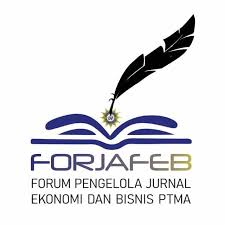Peningkatan Kinerja Organisasi Melalui Kepemimpinan Spiritual, Green HRM dan Percieved Organizational Support
DOI:
https://doi.org/10.32534/jv.v19i2.5557Keywords:
Spiritual Leadership, Green Human Resource Management, Perceived Organizational Support, Organizational PerformanceAbstract
In the current era of globalization, the business world is required to provide environmental and social protection regarding its products and services. Consumers apart from wanting the services and products they need, also want their products and services to have no impact on the environment and society. To achieve competitive and sustainable advantage, environmentally friendly business management is the solution. This research aims to analyze the role of perceived organizational support in moderating the influence of spiritual leadership and green human resource management on organizational performance. The research population was employees at shipping companies in South Jakarta. A sample of 100 respondents was taken using random sampling technique. Data was collected through questionnaires. Data analysis uses the SEM-PLS approach. The research results found that spiritual leadership and Green human resource management directly have a significant influence on organizational performance. Perceived organizational support has not been able to strengthen the influence of spiritual leadership and green human resource management on organizational performance.
References
Acquah, I. S. K., Agyabeng-Mensah, Y., & Afum, E. (2020). Examining the Link Among Green Human Resource Management Practices, Green Supply Chain Management Practices and Performance. Benchmarking: An International Journal, 28(1), 267–290. https://doi.org/10.1108/BIJ-05-2020-0205
Agyabeng-Mensah, Y., Ahenkorah, E., Afum, E., Nana Agyemang, A., Agnikpe, C., & Rogers, F. (2020). Examining the Influence of Internal Green Supply Chain Practices, Green Human Resource Management and Supply Chain Environmental Cooperation on Firm Performance. Supply Chain Management, 25(5), 585–599. https://doi.org/10.1108/SCM-11-2019-0405
Alrowwad, A., Abualoush, S. H., & Masa’deh, R. (2020). Innovation and Intellectual Capital as Intermediary Variables among Transformational Leadership, Transactional Leadership, and Organizational Performance. Journal of Management Development, 39(2), 196–222. https://doi.org/10.1108/JMD-02-2019-0062
Barney, J. B. (1991). Firm Resource and Sustained Competitive Advantage. Journal of Manajement, 17(1), 99–120. https://doi.org/10.1177/014920639101700108
Bombiak, E., & Marciniuk-Kluska, A. (2018). Green Human Resource Management as a Tool for the Sustainable Development of Enterprises: Polish Young Company Experience. Sustainability (Switzerland), 10(6), 1739. https://doi.org/10.3390/su10061739
Caldera, H. T. S., Desha, C., & Dawes, L. (2019). Evaluating the Enablers and Barriers for Successful Implementation of Sustainable Business Practice in ‘Lean’ SMEs. Journal of Cleaner Production, 218, 575–590. https://doi.org/10.1016/j.jclepro.2019.01.239
Ch’ng, P. C., Cheah, J., & Amran, A. (2021). Eco-Innovation Practices and Sustainable Business Performance: The Moderating Effect of Market Turbulence in the Malaysian Technology industry. Journal of Cleaner Production, 283, 124556. https://doi.org/10.1016/j.jclepro.2020.124556
DeConinck, J. B., Moss, H. K., & Deconinck, M. B. (2018). The Relationship between Servant Leadership, Perceived Organizational Support, Performance, and Turnover among Business to Business Palespeople. Global Journal of Managment and Marketing, 2(1), 38–53. https://doi.org/10.14738/abr.510.3730
Demartini, P., & Paoloni, P. (2011). Assessing Human Capital in Knowledge Intensive Business Services. Measuring Business Excellence, 15(4), 16–26. https://doi.org/10.1108/13683041111184071
Dentchev, N., Rauter, R., Jóhannsdóttir, L., Snihur, Y., Rosano, M., Baumgartner, R., Nyberg, T., Tang, X., van Hoof, B., & Jonker, J. (2018). Embracing the Variety of Sustainable Business Models: A prolific Field of Research and a Future Research Agenda. Journal of Cleaner Production, 194, 695–703. https://doi.org/10.1016/j.jclepro.2018.05.156
Djaelani, A. K., Sanusi, A., & Trianmanto, B. (2020). Spiritual Leadership, Job Satisfaction, and its Effect on Organizational Commitment and Organizational Citizenship Behavior. Management Science Letters, 10(16), 3907–3914. https://doi.org/10.5267/j.msl.2020.7.020
Elias, E. M., Othman, S. N., & Yaacob, N. A. (2017). Relationship of Spirituality Leadership Style and SMEs Performance in Halal Supply Chain. International Journal of Supply Chain Management, 6(2), 166–176. https://doi.org/10.59160/ijscm.v6i2.1710
Faisal, S. (2023). Green Human Resource Management - A Synthesis. Sustainability, 15(3), 2259. https://doi.org/10.58419/gbs.v9i1.912312
Fry, L., & Kriger, M. (2009). Towards a Theory of Being-Centered Leadership: Multiple Levels of being as Context for Effective Leadership. Human Relations, 62(11), 1667–1696. https://doi.org/10.1177/0018726709346380
Fry, L. W. (2003). Toward a Theory of Spiritual Leadership. The Leadership Quarterly, 14(6), 693–727. https://doi.org/10.1016/j.leaqua.2003.09.001
Fry, L. W. (2005a). Introduction to The Leadership Quarterly Special Issue: Toward a Paradigm of Spiritual Leadership. Leadership Quarterly, 16(5), 619–622. https://doi.org/10.1016/j.leaqua.2005.07.001
Fry, L. W. (2005b). Toward A Theory of Ethical and Spiritual Well-Being, and Corporate Social Responsibility Through Spiritual Leadership. In Positive Psychology in Business Ethics and Corporate Responsibility (pp. 47–83). Greenwich: Information Age Publishing. Retrieved from https://iispiritualleadership.com/wp-content/uploads/docs/SLTEthics.pdf
Fry, L. W., Latham, J. R., Clinebell, S. K., & Krahnke, K. (2016). Spiritual Leadership as a Model for Performance Excellence: A Study of Baldrige Award Recipients. Journal of Management, Spirituality and Religion, 14(1), 1–26. https://doi.org/10.1080/14766086.2016.1202130
Fry, L. W., Vitucci, S., & Cedillo, M. (2005). Spiritual Leadership and Army Transformation: Theory, Measurement, and Establishing a Baseline. The Leadership Quarterly, 16(5), 835–862. https://doi.org/10.1016/j.leaqua.2005.07.012
Ghouri, A. M., Mani, V., Khan, M. R., Khan, N. R., & Srivastava, A. P. (2020). Enhancing Business Performance Through Green Human Resource Management Practices: An Empirical Evidence from Malaysian Manufacturing Industry. International Journal of Productivity and Performance Management, 69(8), 1585–1607. https://doi.org/10.1108/IJPPM-11-2019-0520
Haddock-Millar, J., Sanyal, C., & Müller-Camen, M. (2016). Green Human Resource Management: A Comparative Qualitative Case Study of a United States Multinational Corporation. International Journal of Human Resource Management, 27(2), 192–211. https://doi.org/10.1080/09585192.2015.1052087
Hair, J. F., Risher, J. J., Sarstedt, M., & Ringle, C. M. (2019). When to Use and how to Report the Results of PLS-SEM. European Business Review, 31(1), 2–24. https://doi.org/10.1108/EBR-11-2018-0203
Hair, J. F., Sarstedt, M., Hopkins, L., & Kuppelwieser, V. G. (2014). Partial Least Squares Structural Equation Modeling (PLS-SEM): An Emerging Tool in Business Research. European Business Review, 26(2), 106–121. https://doi.org/10.1108/EBR-10-2013-0128
Hair, J., Hollingsworth, C. L., Randolph, A. B., & Chong, A. Y. L. (2017). An Updated and Expanded Assessment of PLS-SEM in Information Systems Research. Industrial Management and Data Systems, 117(3), 442–458. https://doi.org/10.1108/IMDS-04-2016-0130
Hunsaker, W. D. (2020). Spiritual Leadership and Employee Innovation. Current Psychology, 41(8), 5048–5057. https://doi.org/10.1007/s12144-020-01011-9
Imran, R., & Aldaas, R. E. (2020). Entrepreneurial Leadership: A Missing Link between Perceived Organizational Support and Organizational Performance. World Journal of Entrepreneurship, Management and Sustainable Development, 16(4), 377–388. https://doi.org/10.1108/WJEMSD-10-2019-0077
Islam, A., Zawawi, N. F. M., & Wahab, S. A. (2021). Rethinking Survival, Renewal, and Growth Strategies of SMEs in Bangladesh: The Role of Spiritual Leadership in Crisis Situation. PSU Research Review. https://doi.org/10.1108/PRR-02-2021-0010
Kaplan, R. S., & Norton, D. P. (1992). The Balanced Scorecard: Measures that Drive Performance. Harvard Business Review, 70(1), 71–78. Retrieved from https://steinbeis-bi.de/images/artikel/hbr_1992.pdf
Kasmawati, Y. (2023a). Kepemimpinan Spiritual : Bagaimana Dampak pada karyawan dan organisasi, Suatu Tinjauan Literatur ? SEIKO : Journal of Management & Business, 6(2), 438–449. https://doi.org/10.37531/sejaman.v6i2.5466
Kasmawati, Y. (2023b). Strategi Peningkatan Kinerja Melalui Kepemimpinan Spiritual Dan Kompetensi. Jurnal Ekobistek, 12(2), 646–651. https://doi.org/10.35134/ekobistek.v12i2.597
Kusi, M., Zhao, F., & Sukamani, D. (2021). Impact of Perceived Organizational Support and Green Transformational Leadership on Sustainable Organizational Performance: A SEM Approach. Business Process Management Journal, 25(5), 1373–1390. https://doi.org/10.1108/BPMJ-09-2020-0419
Longoni, A., Luzzini, D., & Guerci, M. (2018). Deploying Environmental Management Across Functions: The Relationship Between Green Human Resource Management and Green Supply Chain Management. Journal of Business Ethics, 151(4), 1081–1095. https://doi.org/10.1007/s10551-016-3228-1
Malone, P. N., & Fry, L. W. (2003). Transforming schools through spiritual leadership: A field experiment. 2003 National Meeting of the Academy of Management, 1–40. Retrieved from https://iispiritualleadership.com/wp-content/uploads/docs/SLTAOMPeggy0106.pdf
Masri, H. A., & Jaaron, A. A. M. (2017). Assessing Green Human Resources Management Practices in Palestinian Manufacturing Context: An Empirical Study. Journal of Cleaner Production, 143, 474–489. https://doi.org/10.1016/j.jclepro.2016.12.087
Musenze, I. A., & Mayende, T. S. (2023). Ethical Leadership (EL) and Innovative Work Behavior (IWB) in Public Universities: Examining the Moderating Role of Perceived Organizational Support (POS). Management Research Review, 46(5), 682–701. https://doi.org/10.1108/MRR-12-2021-0858
Narc?kara, E. B., & Zehir, C. (2016). Effect of Organizational Support in the Relationship between Spiritual Leadership and Performance. International Journal of Humanities and Social Science, 6(12), 29–42. Retrieved from http://www.ijhssnet.com/journals/Vol_6_No_12_December_2016/3.pdf
Opatha, H. H. D. N. P., & Arulrajah, A. A. (2014). Green Human Resource Management: Simplified General Reflections. International Business Research, 7(8), 101–112. https://doi.org/10.5539/ibr.v7n8p101
Orobia, L. A., Tusiime, I., Mwesigwa, R., & Ssekiziyivu, B. (2020). Entrepreneurial Framework Conditions and Business Sustainability Among the Youth and Women Entrepreneurs. Asia Pacific Journal of Innovation and Entrepreneurship, 14(1), 60–75. https://doi.org/10.1108/apjie-07-2019-0059
Pradhan, R. K., & Hati, L. (2022). The Measurement of Employee Well-being: Development and Validation of a Scale. Global Business Review, 23(2), 385–407. https://doi.org/10.1177/0972150919859101
Ren, S., Tang, G., & Jackson, S. E. (2018). Green Human Resource Management Research in Emergence : A Review and Future Directions. Asia Pac J Manag, 35, 769–803. https://doi.org/10.1007/s10490-017-9532-1
Sanlioz, E., Sagbas, M., & Surucu, L. (2022). The Mediating Role of Perceived Organizational Support in the Impact of Work Engagement on Job Performance. Hospital Topics, 1–14. https://doi.org/10.1080/00185868.2022.2049024
Setyoko, P. I., Wahyuningrat, & Denok Kurniasih. (2022). The Role of perceived organizational support (POS), organizational virtuousness (OV) on performance and employee well-being (EWB) of non-profit organizations in the post-pandemic period. Journal of Pharmaceutical Negative Results, 1940–1944. https://doi.org/10.47750/pnr.2022.13.s08.236
Shah, M. (2019). Green human resource management: Development of a valid measurement scale. Business Strategy and the Environment, 28(5), 771–785. https://doi.org/10.1002/bse.2279
Smriti, N., & Das, N. (2018). The Impact of Intellectual Capital on Firm Performance: A Study of Indian Firms Listed in COSPI. Journal of Intellectual Capital, 19(5), 935–964. https://doi.org/10.1108/JIC-11-2017-0156
Solimun, Fernandes, A. A. R., & Nurjannah. (2017). Metode Statistika Multivariat Pemodelan Persamaan Struktural (SEM) : Pendekatan WarpPLS (Cetakan Ke). UB Press.
Suharti, L., & Sugiarto, A. (2020). A Qualitative Study of Green HRM Practices and Their Benefits in the Organization: An Indonesian Company Experience. Business: Theory and Practice, 21(1), 200–211. https://doi.org/10.3846/btp.2020.11386
Svensson, G., Ferro, C., Hogevold, N., Padin, C., & Sosa Varela, J. C. (2018). Developing A Theory of Focal Company Business Sustainability Efforts in Connection with Supply Chain Stakeholders. Supply Chain Management, 23(1), 16–32. https://doi.org/10.1108/SCM-12-2015-0461
Wulansari, N. A., Witiastuti, R. S., & Ridloah, S. (2019). Green Lifestyle and Pos: Which One Does Have the Biggest Role in Influencing the Influence of Green Hrm on Employee Performance? Jurnal Bisnis Dan Manajemen, 20(1), 3–14. https://doi.org/10.24198/jbm.v20i1.212
Yong, J. Y., Yusliza, M.-Y., Jabbour, C. J. C., & Ahmad, N. H. (2020). Exploratory Cases on the Interplay between Green Human Resource Management and Advanced Green Manufacturing in Light of the Ability-Motivation- Opportunity Theory. Journal of Management Developmen, 39(1), 31–49. https://doi.org/10.1108/JMD-12-2018-0355
Yusliza, M. Y., Norazmi, N. A., Jabbour, C. J. C., Fernando, Y., Fawehinmi, O., & Seles, B. M. R. P. (2019). Top Management Commitment, Corporate Social Responsibility and Green Human Resource Management: A Malaysian Study. Benchmarking : : An International Journal, 26(6), 2051–2078. https://doi.org/10.1108/BIJ-09-2018-0283
Zaid, A. A., Jaaron, A. A. M., & Talib Bon, A. (2018). The impact of green human resource management and green supply chain management practices on sustainable performance: An empirical study. Journal of Cleaner Production, 204, 965–979. https://doi.org/10.1016/j.jclepro.2018.09.062
Zhao, W., & Huang, L. (2022). The Impact of Green Transformational Leadership, Green HRM, Green Innovation and Organizational Support on the Sustainable Business Performance: Evidence from China. Economic Research-Ekonomska Istrazivanja, 35(1), 6121–6141. https://doi.org/10.1080/1331677X.2022.2047086


















